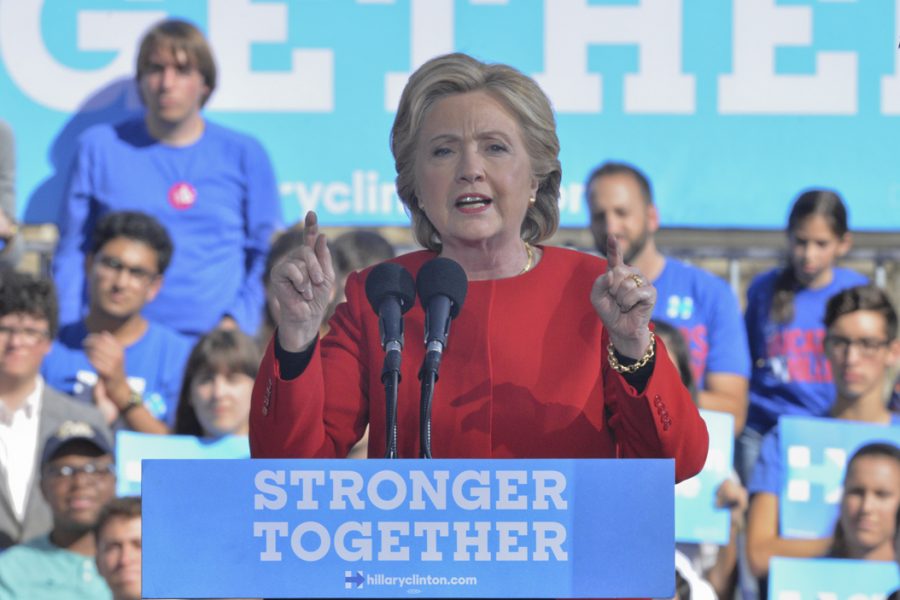After an election that mystified many predictions, Jill Stein and other Pennsylvania state and county representatives are leading a fight to verify the results.
Stein, who ran for the presidency as the Green Party candidate, called for a recount of votes in three states — Michigan, Wisconsin and Pennsylvania — in late November. After withdrawing a request for a recount in state court Saturday, Stein filed a federal lawsuit on Monday requesting a recount on the basis of claims that the voting process in Pennsylvania is subject to inaccuracies.
On the same day Stein filed for a statewide recount, the Allegheny County Elections Division checked votes in 52 districts Monday, including 33 in Pittsburgh, with a recanvass.
The recount that Stein is calling for would require tallying all the votes again statewide, meaning checking the number of votes each candidate received. Monday’s recanvass, though, reviewed the vote totals from each machine in the participating districts to make sure they matched what was reported on election night.
The results of the recanvass, which focused only on the Presidential and United States Senate elections, matched the results on Election Day.
According to data from the state department, Republican candidate Donald Trump won Pennsylvania with 48.60 percent of the vote, while Democratic candidate Hillary Clinton received 47.83 percent. Libertarian candidate Gary Johnson received 2.40 percent, Constitutional party candidate Darrell Castle received 0.35 percent and Stein took 0.82 percent of the vote.
As protests continue with cries to “resist Trump” and calls for electors from each state, who make up the Electoral College, to refuse to cast their vote for Trump on Dec. 19, there are still those holding out hope that Trump won’t make it into the Oval Office after all.
At Pitt, students who both supported and voted against Trump, said the recount has important benefits — particularly peace of mind for those surprised by the results — but that it’s time for students to focus their energies on other causes.
Chelcie Alcorn, a senior studying psychology, said the recount is important if people have questions about the “integrity of our electoral process.” The final product though, she said, most likely will not be different from the initial results.
“I don’t want to give them false hope. We should be working toward 2018 and 2020,” Alcorn said. “I don’t want people to think ‘oh, there’s a recount, so I can finally breath again.’”
Trump partly caused the initial speculation about this election, she said, when he tweeted about “millions of people voting illegally.”
“What he’s doing when he says stuff like that is undermining our election process,” Alcorn said. “And if we don’t have that, what do we do we have really?”
Michael Yorgey, a junior business information systems major, said that although people have the right to challenge the vote, it is unclear what Stein’s motives are in the recount. The whole process, he said, feels like a scam.
“I don’t think it’s people supporting the recount,” Yorgey said. “I think it’s more just ‘I don’t want Trump.’”
When watching Pennsylvania “go red” on election night, Yorgey, who is from York, said he felt as if his vote really mattered. That would only change, he said, if the recount led to a change in the results for reasons that did not point to voter fraud or issues with counting or the machines.
“If [the recount] leads to a result that is actually legitimate that there was rigging, then I don’t feel like my vote is undermined,” Yorgey said. “But if the reasons are illegitimate, then yeah, it takes away everything.”
Viola Garis, a senior English and anthropology major, said even if the recount doesn’t lead to any changes, it could at least lead to reassurance that the electoral system is working the way it is supposed to.
Garis, who voted for Clinton, said the electoral college did not necessarily seem “fair” because this is the second controversial election she has watched where a candidate who did not win the popular vote won the presidency, referring to the 2000 election between George W. Bush and Al Gore.
“That feels unfair to me, but that’s the way our electoral system is set up,” Garis said.
Garis isn’t the only one feeling duped by the electoral system — which is set up in the Constitution. State Sen. Daylin Leach just introduced legislation in Pennsylvania to join a compact made up of 11 states favoring the popular system.
Still, Garis said, people should focus less on disproving the results and more on what they can do as individuals to further the causes they are passionate about, even if the administration doesn’t agree with them.
It’d be best, she said, to work on an issue basis, whether that be supporting LGBTQ+ rights or gender equality. Personally, Garis and her friends are looking for community organizations to volunteer with.
“I don’t want to be the kind of person that says ‘you lost, get over it,’ but we lost,” Garis said. “There are better things to be done than contesting an election that doesn’t need to be contested.”


